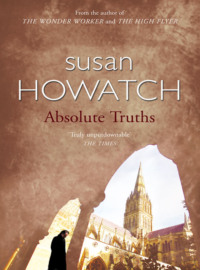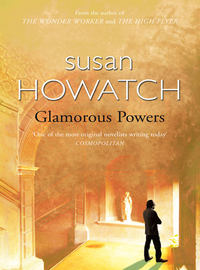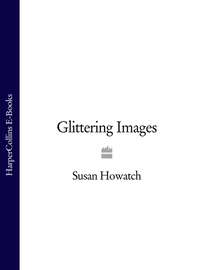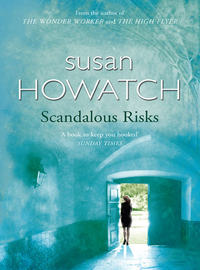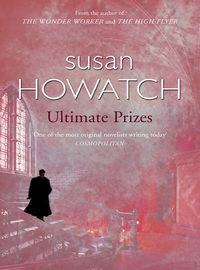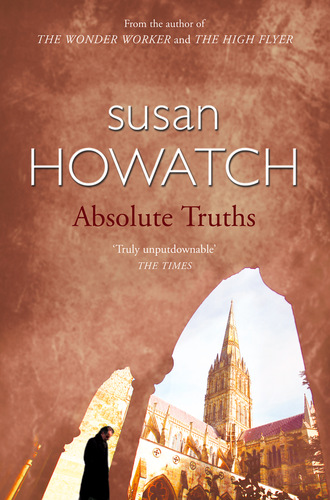
Полная версия
Absolute Truths
‘The kind that pave the road to hell,’ muttered Lyle, shoving Samson’s letter under the locked bedroom door.
More agonising minutes passed. We went away. We waited. We returned. We banged futilely on the panels. We took it in turns to beg him to let us in. At last, egged on by Lyle and feeling nearly demented with anxiety, I fetched a screwdriver, opened up the lock and forced my way into the room. It was empty. Charley had made a rope of sheets and escaped through the window. The letter was lying unopened on the floor.
No mere words could describe the sheer horror of the next few hours, so I shall merely record our ordeal as tersely as possible. First of all I hauled up the sheets before they could be spotted by our neighbours. Then we began our search, but enquiries at the station and bus terminal proved fruitless.
At one stage I was in such despair that I said, ‘Supposing he’s tried to kill himself by jumping into the Cam?’ but Lyle, hiding her terror behind an ice-cool façade, answered: ‘If he leapt into the river he’d make damn sure there were plenty of people around to haul him out.’
We returned home to sweat blood and plot our next move, but we could think of nothing to do except wait by the telephone. It seemed too soon to notify the police. However as the hours passed and no contrite call came I was obliged to notify the headmaster that Charley would not be returning to school that evening. I was tempted to lie by saying he was ill, but I knew I had to tell a story which bore some resemblance to the truth in case the absence lasted some time, so I said that Charley had run away after a family disagreement. When the headmaster had recovered from his astonishment he was so kind that I had difficulty in sustaining the conversation, but I did say I would take his advice to call the police.
More appalling conversations followed. The policemen clearly felt they were being troubled unnecessarily and said they were sure Charley would turn up, probably sooner rather than later. No sooner had they departed than a neighbour dropped in, saw the uneaten birthday cake in the kitchen and demanded an explanation. The grapevine began to hum. The local paper got hold of the story. Garish headlines screamed: ‘PROFESSOR’S SON VANISHES, SUICIDE OR SNATCH?’ We fobbed off our friends’ enthralled enquiries by saying we needed to keep the telephone line open, but some of them still insisted on calling in to commiserate with us. The schadenfreude generated by a clergyman’s son who goes off the rails is massive indeed.
I was just thinking how very pleasant it would be to spend a week in the nearest mental hospital, far from this repulsively madding crowd, when Jon rang from his home near Starbridge and said: ‘He’s here. He’s unharmed. Be sure you bring the letter when you come to fetch him.’
I drove through the night with the letter in my breast pocket, and when I reached Jon’s home the next morning I found Charley sitting on the steps of the porch as he waited for me. Halting the car I jumped out and rushed over to him and when he muttered: ‘You didn’t have to drive through the night,’ I shouted: ‘What the hell else did you expect me to do?’ – not the mildest of replies, but I was almost passing out with relief. At that point Charley broke down and began to whimper, but I grabbed him and held him so tightly that both of us were unable to do more than struggle for breath. Eventually Jon appeared and announced, rather in the manner of a tactful butler, that breakfast was available in the dining-room.
When Charley and I were alone together he told me he had completed the long journey by walking and by thumbing lifts. Having little money he had slept under hedges and survived on a diet of Mars bars. ‘The whole journey was hell,’ he concluded morosely, ‘but I wanted to see Father Darrow. I thought he’d know about everything and I’m sure he does, but he said you could explain it all better than he could.’ He hesitated but added: ‘He also said I should read the letter because letters from the dead should be treated with respect.’
I handed over the letter. Charley pocketed it and embarked upon his breakfast. He ate two fried eggs, a sausage, three rashers of bacon and a fried tomato while I toyed with half a piece of toast. Eventually I withdrew to the cloakroom where I at last achieved my ambition to vomit. On my departure from the dining-room I had heard the faint noise of tearing paper as Charley at once opened the envelope.
When I rejoined him I found that the envelope had disappeared.
Charley’s careful comment was: ‘That was an interesting letter. I might let you read it one day.’
Not surprisingly, I found myself unable to reply.
‘I was thinking,’ said Charley, ‘what a useful thing it was that Mum took me to see him – I mean him – back in 1945 when I was old enough to remember him properly. If I hadn’t seen him, I might always have wondered what he was like.’
I managed to agree that this was quite possible.
‘He seemed to like you a lot,’ said Charley at last. ‘Of course he took the blame for everything, and that was right, wasn’t it? You were the hero of the story and he was … well, what was he exactly? I can’t quite make him out. Was he a villain? Or a fool? Or a tragic figure felled by hubris like Charles Stewart Parnell? Or …’ His voice trailed away.
The pause lengthened.
Eventually Charley said in a rush: ‘Of course if you’d rather I didn’t ask any questions –’
‘But of course you must ask questions!’ I said, finally summoning the strength to behave as I should. ‘And of course I must answer them as truthfully as possible!’
But I think I knew, even as I expressed this admirable intention, that the absolute truth about my wife’s lover was still quite beyond my power to articulate.
TWO
‘Bad pride is negative; it blinds us to truths of fact or even of reason …’
AUSTIN FARRER
Warden of Keble College, Oxford, 1960–1968
A Celebration of Faith
I
I should much prefer to say no more about this dreadful scene with Charley, but unfortunately I have to go on to record what a hash I made of it; the consequences were so far-reaching.
‘It would be uncharitable to call him a villain,’ I said to Charley as I embarked on this doomed attempt to depict Samson in the light of truth, ‘and it would certainly be inaccurate to describe him as a fool. One could, perhaps, acknowledge a resemblance to Parnell, but only a superficial one. After all, Parnell was not a clergyman of the Church of England who broke the vows he made at his ordination.’ As I spoke I insisted to myself that I should speak the truth. I also insisted that I would not let the truth be distorted by my anger. I told myself fiercely: I shall not lie.
‘He was a gifted man who had weaknesses which made him vulnerable,’ I found myself saying. ‘I felt sorry for him. At the end of his life he could be considered a pathetic figure, a man ruined by the flaws in his character – but I mustn’t judge him too harshly. That wouldn’t be right.’
I drank some tea. Eventually I said: ‘It was a tragedy that those inherent weaknesses wrecked his life and wasted his talents.’
‘When you say “weaknesses”, do you mean –’
‘I mean primarily his weakness for women. It clouded his judgement. His disastrous marriage was quite obviously an example of a sexual attraction which had soon faded … but I don’t want to be too harsh on him.’
There was a pause. As I waited for the next question I saw with dismay that Charley had lost his brave air of nonchalance. His face had a pinched look.
‘I don’t want to be too harsh on him,’ I repeated hurriedly, trying to put things right. ‘Anyone can make a mistake.’ But before I could stop myself I was saying: ‘It was just a pity his mistakes were so crucial. His weakness for women was compounded by a tendency to drink too much. Certainly he enjoyed a luxurious style of life which was quite unsuitable for a priest, and in the circumstances it was hardly surprising that his moral will was sapped so that he was unable to resist the temptation which your mother presented … although of course I don’t mean to pass judgement on him for what he did to her. All judgements must be left to God.’
Charley said unevenly: ‘I just don’t understand how Mum could ever have –’
‘Oh, the whole episode was entirely his fault. She was an innocent young woman corrupted by a sophisticated older man,’ I said, but I knew at once I could not let that statement stand unmodified. Furiously I told myself: I WILL NOT LIE. ‘No, let me rephrase that last sentence,’ I said rapidly. ‘By using a cliché I’ve made the affair sound simple and it wasn’t. It was complicated.’ But even as I spoke I was thinking: Charley wants simplicity, not complexity; he wants certainties, not ambiguities; it really would be kinder to him to sketch the story in black and white.
‘But never mind all that,’ I said even more rapidly. ‘The rock-bottom truth is that he was older than she was and should have known better. Of course I’m tempted to blame him for putting her through hell, but in fact it’s futile to assign blame since our prime task is to forgive. As I keep saying, I don’t mean to pass judgement on him for what he did.’ Realising that I was becoming convoluted, once more passing judgement and rescinding it in the same breath, I made a mighty new effort to be clear and simple.
‘You don’t have to worry,’ I said. ‘I’ve brought you up. I’ve made you what you are. So long as you model yourself on me you’ll never have to worry that you’ll make a mess of your life as he did.’
Charley by this time seemed to be barely breathing. His pallor had a faint greenish tinge.
‘Upbringing’s the important thing,’ I said at top speed. ‘You needn’t worry about your heredity. I often think how like me you are, sharing so many of my interests.’
‘All I ever wanted,’ said Charley painfully, ‘was to be just like you.’
‘In that case there’s no need for you to give this man –’ I could not name him ‘– a second thought. I mean, of course you’ll give him a second thought –’ I was tying myself in knots again ‘– but there’s no need for you to become obsessed by him. We’ll give him a code-name,’ I said, fastening on the device which enabled top-secret matters to be referred to with discretion, ‘and then he can be filed away. He won’t be lost or forgotten. He’ll merely be out of sight unless we choose to recall him.’
But Charley was already worrying about something else. ‘Should I refuse to accept the legacy?’
‘Certainly not!’ I was startled by this question and also, at some profound level, distressed. I remembered the sacrifice implicit in that letter, the love given without hope of any return.
‘I just want to do what you want, and if you think it would be safer for me to reject him altogether –’
‘No, no, that wouldn’t be right at all! If you reject the legacy you’re really passing judgement on him, but our business is to forgive, not to condemn.’
It was all true, of course. Yet it was all, subtly, false. Later I tried to work out how I could have eradicated the distortion, but I was never able to decide where the distortion had come from and how I could have eradicated it. Later still I did think to myself: one day Charley should know just how selflessly that man loved him. But the thought vanished, pushed aside by my enormous relief that the crisis was past. Charley had emerged from his ordeal more devoted to me than ever while I was now free to rebury Samson in the nostalgia drawer of my memory.
Telephoning Lyle five minutes later I told her we were all set to live happily ever after.
II
Did we all live happily ever after? No. As soon as Charley had returned to a stable state Michael began to cause trouble.
I told Michael about the skeleton in the family cupboard as soon as he returned home for the half-term holiday. I had had no choice. Charley’s escapade, now public knowledge, had to be explained, and with dread I steeled myself for yet another parental ordeal.
Michael, who was then sixteen and still more interested in cricket than in girls, listened with astonishment to my brief recital of the facts and afterwards appeared to be too nonplussed to offer any comment. I did stress that Lyle had been a mere innocent victim but I soon discovered that his mother’s consent to the affair was not what was puzzling him. ‘She’s still Mum no matter what she did,’ he said commendably before adding: ‘But why didn’t she go to hospital and have Charley removed when he was no more than a blob?’
I was considerably shocked by this reaction, unmodified as it was by anything which resembled a Christian morality, and as a result I found myself discussing the ethics of abortion, but Michael was uninterested in generalities, only in his mother. ‘She must have been mad to have wanted a baby in those circumstances,’ he said. ‘The older I get the more peculiar I think women are.’ And before I could comment on this verdict he asked: ‘If Charley’s not your real son, why do you spend so much time slobbering over him?’
‘I don’t slobber over him!’
‘Oh yes, you do! Mum says it’s because Charley’s small and plain and needs encouragement, but why should I be penalised just because I’m tall and good at games and okay to look at?’
‘Nobody’s penalising you! You mean just as much to me as Charley does!’
‘Why don’t I mean more? If you’re not his father –’
‘For all practical purposes,’ I said, trying to remain calm, ‘I am his father, and anyway, regardless of who his father is, he’s still your brother and I’m sorry that you make so little effort to get on with him.’
‘I don’t care who he is, I think he’s a louse.’
‘That’s the most unchristian thing to say!’
‘So what? Lots of Christians are unchristian – look at Charley’s real father! He didn’t exactly behave in a very Christian way, did he, and he was a clergyman!’
‘Well, of course he was a clerical failure. I’m not denying he was a disgrace to his profession and I’m not denying that the Church, like any large organisation, has the occasional rotten apple in its barrel, but Christians in general do at least try to live decent lives, and –’
‘Too bad they so seldom succeed!’
At that point I lost my temper and Michael lost his. The scene ended shortly afterwards when he yelled: ‘Bloody hell!’ and bolted straight to his mother to complain that I had been unfair to him. Lyle was livid. We had a row. She accused me of getting up on my Christian soap-box and pontificating; I retorted that I had a duty to draw the line when Michael started slandering the Church. Lyle then accused me of short-changing Michael; I then accused her of spoiling him rotten. Lyle said the whole grisly episode, beginning with Charley’s running away, reminded her of the parable of the prodigal son, and what a pity it was that Jesus had never recorded the feelings of the prodigal son’s mother. I said that Jesus had had no need to record the feelings of the mother in order to make his theological point, and Lyle shouted that she hated theological points and hated theologians who pulled out all the intellectual stops in order to win an argument and make their wives feel miserable. Seconds later I was deafened by the slamming of the door as she stormed out of the room.
I did look around for something to smash but fortunately no suitable object lay invitingly to hand and anyway after nearly nineteen years of marriage I knew there were better ways of resolving marital quarrels than behaving like a Cossack. I allowed Lyle time to cool off. Then I followed St Paul’s admirable advice (‘Let not the sun go down upon your wrath’) and made the required gesture of reconciliation. During the cooling-off period I consumed one very dark whisky-and-soda and meditated on my heroes of the Early Church, those titans who had been obliged to abstain from marriage. How would St Athanasius, a bishop popular with the ladies, have adjusted to the wear and tear of married life? His energy reserves might well have been so seriously depleted that he would have been unable to dredge up the enormous strength required to be contra mundum, with the result that the Arian heresy would have prevailed – but no, heresy never prevailed in the end because always truth was ‘the daughter of time’. With a sigh I absolved the imaginary wife of Athanasius from ensuring the triumph of Arianism.
Later that evening Charley obliquely expressed his new anxiety about our relationship by saying to me: ‘I’m worried about Michael. Supposing he thinks you just took me on because you wanted to marry Mum? Supposing he thinks you don’t really like me at all and that secretly you regard me as a ghastly reminder of the past?’
‘He couldn’t possibly think anything so ridiculous! I decided to take you on from the moment I knew you existed. I regarded it as a very special and quite unmistakable call from God.’
‘And later you didn’t privately moan and groan and regret the whole thing?’
‘Oh, don’t be so melodramatic and absurd!’
‘But –’
‘All right, no, I didn’t. What an idea!’
‘And you’re sure I don’t remind you of him all the time?’
‘Of course I’m sure! As I’ve already said, you often remind me of myself.’
‘And you’re sure that if I go on modelling myself on you everything will be all right?’
‘Absolutely certain,’ I said, now so exhausted by the demands of family life that I barely knew what I was saying, and so it was that we set off along the path which was to end so cataclysmically nine years later in 1965.
III
The interval between 1956 and 1965 seemed to pass with extraordinary speed, possibly because I had reached that point in middle age when the years go by faster and faster, but certainly because my change of job thrust me into a frenetic new world in which there never seemed to be enough time to do all that needed to be done.
In 1957 I was offered the Starbridge bishopric.
My first thought was that this was the one bishopric I could never accept. How could I take Lyle back to the scene of her disastrous love affair, and how could I myself face returning to the place which I always associated with my first catastrophe, the spiritual crisis which had almost brought my ministry to a very sticky end? Then slowly, with mounting dismay, I realised I had been manoeuvred into a position where the bishopric was the one job I could not refuse.
At first I thought the manoeuvring was being done by the Devil – or whatever one chooses to call the dark underside of creation which gives God so much trouble in achieving his plans for humanity. Then I thought the manoeuvring was an illusion and that I was the victim of blind chance. But in the end I decided that blind chance alone could never have ensured the snug fit of the metaphorical strait-jacket in which I now found myself encased, and I had to acknowledge that God was touching my life in the manner of a potter reshaping the clay on his wheel – if I may cite the analogy drawn by my Oxonian friend Dr Farrer. For some reason I was to be plucked from my ivory tower, where I was so comfortable, and dumped back in a city where I had been very uncomfortable indeed. This was such an unwelcome truth that I was reluctant to believe it, but when I realised I could not decline the appointment without incurring the wrath of that tough disciplinarian Archbishop Fisher, I accepted with a sinking heart that I was going to have to leave Cambridge. Ecclesiastical Starbridge begged, the Archbishop ordered, the letter from Downing Street arrived and the Queen smiled. I was doomed.
I had already turned down two bishoprics. Contrary to what many laymen think, not all clergymen aspire to high office, and because of my lack of parish experience and my success in academic life I had had no trouble accepting the idea that I would spend the rest of my working life as a divinity professor. However a call from God is a call from God, and since my duty was to serve my Maker, not to sulk impertinently, I made a big effort to regard the radical rewriting of my future in a positive light.
The diocese lay in the south of England, in the half of the country where I belonged, so I knew I could settle there without feeling like a foreigner. (I have never been at ease north of Cambridge.) Starbridge was set in beautiful countryside yet was only an hour and a half by train from London. There was a seat immediately available in the House of Lords, a fact which ensured I had an influential platform on which to expound my views on education, and there was even a theological college crying out in the Cathedral Close for reform by a divinity professor. (This was the main reason why I was considered uniquely suited for the job and why Archbishop Fisher told me brusquely to ‘stop bleating on and on about Cambridge’.) Indeed the bishopric was far from being an unattractive prospect and I could see the job would provide me with an exciting challenge. Yet still my misgivings remained.
‘You don’t want to go back there, do you?’ I said to Lyle when I was still agonising about the decision, but Lyle stunned me by replying: ‘Why not?’ Apparently she was now unperturbed by memories of her love affair. ‘The 1930s are another world,’ she said, ‘and we don’t live in that world any more.’ She also admitted she was only too keen to leave behind the twittering gossips of Cambridge who had thrived on the scandal of Charley’s birthday brainstorm.
‘… and then there’s the matter of the curtains,’ she added as an afterthought.
‘What curtains?’
‘I ordered the curtains for Carrie when the Jardines moved from Radbury to Starbridge in 1932. I remember fingering the material in the shop and dreaming that I was the bishop’s wife, ordering the curtains for my very own episcopal palace – and isn’t it nice to think my dream’s finally going to come true?’
I was amazed. I could quite see that there was a certain pleasure to be derived from the fact that Lyle would be returning in triumph as the bishop’s wife to the Cathedral Close where she had once been no more than a paid companion, but I was still so taken aback by her unambivalent enthusiasm that I could only say: ‘We won’t be living in the palace where you lived with the Jardines.’
‘Yes, isn’t that fortunate! No poignant memories of Alex and Carrie to make me weepy – and anyway the palace was hell to run. The South Canonry will be much easier.’
I retreated into a baffled silence.
‘It’s a bit odd, isn’t it?’ I said to my spiritual director during an emergency conference with him.
‘Is it, Charles?’
‘Well, she seems to have forgotten everything – except that she can’t have done because she talks of finally exorcising the past.’
‘I think we can acquit her of amnesia. Perhaps the truth is that she herself has come to terms with the past and hopes that in Starbridge you’ll be able to come to terms with it too.’
‘But I came to terms with it years ago! It’s all tucked neatly away in the nostalgia drawer alongside Edward the Eighth, Jack Buchanan, Harold Larwood and Shirley Temple!’
The conversation closed.
IV
I confess I took some time to adjust to being a bishop. In fact I even went through a phase of thinking I had made an appalling mistake and that my manipulation out of Cambridge had been the work of the Devil after all, steering me into a deep depression which would render me useless to God. I did recover from this neurotic suspicion and I did eventually settle down, but for a long while I pined for Cambridge, particularly for the intellectual companionship of my colleagues.
However, there were compensations. I found that in my new life there was less venom directed at me and more respect – in fact there was no venom at all. Although arguments between Christians can be extremely heated, people do usually refrain from being venomous to a bishop. In the bitter feuds which periodically ruffle the surface of academic life, no one is exempt from venomous attack, least of all professors of divinity whose very existence represents an affront to the atheists.


